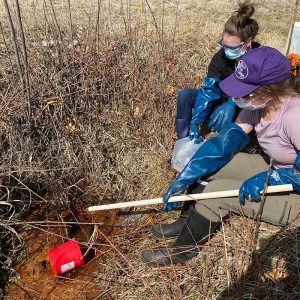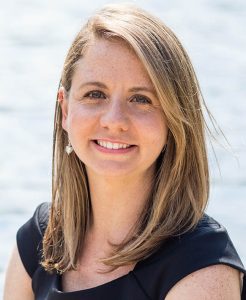April 11, 2022

When senior Elli Castonguay decided she wanted more experience applying environmental engineering to real-world problems, it didn’t take long for Mizzou Engineering faculty to connect her to a research project. Earlier this semester, she was part of an interdisciplinary team that conducted field work in Joplin, Missouri, collecting water samples and studying the health and characteristics of streams impacted by historic mining activities in the area.
Last month, Castonguay presented early findings from that work at a Joint Annual Meeting between the Missouri Section American Water Works Association (AWWA) and Missouri Water Environment Association (MWEA). Now, she’s been asked to submit an article about her research for the AWWA newsletter.
“A lot of people seemed interested in our project,” Castonguay said. “It was a great experience presenting research, especially in an industry setting.”

She and Sarah Fischer, a post-doctoral scholar in the Department of Civil and Environmental Engineering and the School of Natural Resources (SNR) — along with SNR Assistant Professor Alba Argerich and her students — are working together to study water quality in southern Missouri, where historic pit mining for lead, zinc and barium has resulted in water pollution and decades of unsuccessful cleanup attempts.
Specifically, they are trying to unravel the complex interactions of heavy metal contamination, iron and dissolved carbon reactivity and natural microbial respiration in order to better manage pollution’s impact on an otherwise healthy system.
“The idea is to come up with more innovative ways to look at long-term problems around metals, which don’t degrade, and stream health,” Fischer said. “We’re looking for novel solutions such as a more adaptive monitoring response on national levels. This also informs the fate and transport of metals in different forms. Bioremediation that could take advantage of natural bacteria or adapted aquatic plants already in the system is an exciting direction, too.”
In Joplin, where impacted streams run through urban neighborhoods, large remediation efforts must consider the surroundings. Fischer would love to see momentum grow for the mining-district water quality and help create initiatives to revitalize those areas, she noted.

“Our first goal is diagnosing unique chemical and biological processes to get a fundamental understanding of what’s happening,” Fischer said. “We’re looking at stream functions, not just metrics, and what they mean for the stream quality.”
The research doubles as a way to give Mizzou Engineering students the opportunity to work on real-world problems impacting the state, Fischer said.
And it’s a perfect example of the educational pipeline in place at Mizzou.
Castonguay learned about Fischer’s research from Baolin Deng, who is William Andrew Davidson Professor of Civil and Environmental Engineering and co-chair of the Missouri Water Center. Fischer is one of his advisees and part of the University’s prestigious Preparing Future Faculty Program, which allows postdoctoral scholars to experience the full scope of working in academia.
“I like research and mentorship, so I’m really grateful for this opportunity,” Fischer said. “I’m fortunate to have mentors like Dr. Deng and Dr. Argerich and also to serve as a mentor.”
Since joining the research team, Castonguay has received an undergraduate research fellowship and will present her work during Undergraduate Research Week at MU later this month.
The experiences have been life changing.
“Sarah and I have talked a lot about research and graduate school,” Castonguay said. “It’s opened my eyes to a lot of different opportunities and potential career paths.”
Study engineering and conduct undergraduate research that makes a difference! Learn more about civil and environmental engineering at Mizzou.